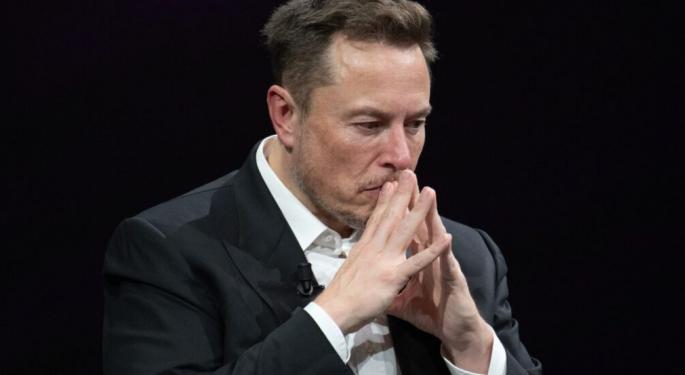Elon Musk Urges U.S. To Cut Reliance On Asia For Semiconductor Chips — 'Fear Of Running Out Is Causing Every Company To Overorder — Like The Toilet Paper Shortage But At Epic Scale'
Supply chain issues created during the global coronavirus pandemic cost automakers billions of dollars in 2021 and prompted some companies to build domestic manufacturing facilities to solve the problem.
"Never seen anything like it," Tesla CEO Elon Musk posted on the platform now known as X. "Fear of running out [of computer chips] is causing every company to overorder — like the toilet paper shortage but at epic scale."
Tesla depends on Taiwan Semiconductor to produce its processors, but it's far from the only U.S. company that relies on overseas manufacturing for the technology. Tech firms like Apple Inc., Amazon.com Inc. and Google get 90% of their chips from Taiwanese contract manufacturers, according to CLSA investment analyst Sebastian Hou.
Check out:
- Investing in real estate just got a whole lot simpler. With as little as $100, average investors are becoming landlords thanks to this Jeff Bezos-backed startup.
- Elon Musk has reportedly bought 6,000 acres of land just outside of Austin. Here’s how to invest in the city’s growth before he floods it with new tech workers.
"It's going to be a challenging and long journey for them to diversify away and thinking about how long it takes for the chip development and cooperation — it's going to take a while," he said on CNBC's "Street Signs Asia."
The U.S. once dominated the semiconductor industry with a 37% global market share in 1990, a figure that declined to 10% in 2022. Supply chain issues during the pandemic highlighted the need for domestic production of semiconductors for national security purposes, according to a report by Savills Research & Data Services.
Recognizing that need, Congress passed the CHIPS and Science Act, enacted in 2022, to provide funding to boost research and manufacturing of semiconductors in the U.S.
In the U.S., about 94.9 million square feet of commercial real estate is dedicated to the chip industry, supporting functions ranging from design and fabrication to research and development (R&D). An additional 200 million square feet of space will be needed if the U.S. wants to increase its global market share of production from 10% to 20%, according to the Savills report.
New Industrial Locations
Company
State
Investment
Jobs
Square feet
Year open
Micron
New York
$20 billion
9,000
2.4 million
2030
Micron
Idaho
$15 billion
2,000
6.5 million
2029
Texas Instruments
Texas
$30 billion
3,000
4.7 million
2025
Intel
Ohio
$20 billion
3,000
2.5 million
2025
TSMC
Arizona
$40 billion
4,500
750,000
2024
Source: Savills Research & Data Services
Silicon Valley in California is considered the hub of the industry, but the recent development of semiconductor facilities is gravitating toward states like Texas and Arizona as companies seek skilled labor, university R&D partnerships and a more reasonable cost of doing business.
More than $223 billion of U.S. semiconductor projects are underway, announced or under consideration, according to McKinsey & Co.
Read next:
© 2025 Benzinga.com. Benzinga does not provide investment advice. All rights reserved.
Posted-In: Elon Musk real estate investing Semiconductor ChipsReal Estate



